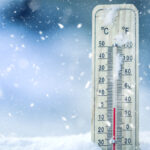
Preparing Your Home for Winter
As winter approaches, keeping your home safe and warm during the cold weather is essential. Below are some housekeeping tips that can help you reduce the chances of damage to your personal property from flooding and keep your home heated efficiently.
Exterior Precautions
The first and most important measure is disconnecting all garden hoses and similar items from outside spigots. These are the first to freeze and burst, leading to flooding, high water bills, and mold and mildew growth opportunities.
Crawlspace Care
If you have a crawlspace, check your foundation vents and ensure they are closed. It’s also important to close any openings in the foundation. Please report any openings to us so we can ensure your foundation is sealed correctly. Small cracks aren’t a big deal, but larger ones could require attention. You can close off large openings with various materials to block drafts from entering the house. Steel wool and fiberglass insulation are great products to use for this purpose. If you have foundation vents that won’t close, place a piece of plastic, cardboard, or even insulation over them. Keeping cold air out of the crawlspace will help prevent frozen pipes and keep heat in your home. Some foundation vents automatically close when it is cold, but checking around your property for areas where cold air and pests can quickly enter your crawlspace never hurts.
Pipe Protection
During very cold snaps, when temperatures are consistently below freezing, you may want to keep any faucets on outside walls slowly dripping to reduce the chance of freezing. Should your pipes freeze, turn off the faucet valve so it doesn’t run once it thaws. Pipes typically thaw without incident but can burst, so monitor them if they freeze. Please notify us immediately if you notice significantly reduced or no water pressure in your home during cold weather. This could indicate that water mains or well outlets have frozen.
Heating Efficiency
The warmest part of the day is the easiest and cheapest time to heat your home. Use common sense and keep doors and windows shut during cold weather; open and use exterior doors sparingly. If you have storm windows, ensure they are closed. If you have any broken windows, let us know.
- Keep your heat set at a reasonable temperature at all times. Allowing your home to get cold while you’re away and significantly raising the temperature when you return puts undue stress on your heating unit. This can increase your power bill because the unit may use auxiliary heat, especially if you have a heat pump.
- Keeping the home at a constant temperature between 65 – 68 degrees is typically the most cost-efficient. Keeping your home too warm can promote moisture and mold growth and increase heating costs. For every 1-degree warmer inside your home, the heating bill goes up 5 to 15 percent depending on the temperature difference between inside and outside and the efficiency of your unit. The colder it is outside, the more expensive it is to heat and maintain heat in your home. It’s cheaper to wear warm clothes and use blankets!
- Don’t shut off rooms and vents to reduce the heating space, as this can overwork your heating unit and reduce its efficiency, costing you money. Keep doors cracked as often as possible to allow the air to circulate correctly. Your heating system is designed to heat and cool the entire house and is rated to move the cubic feet of air in your home. You can restrict the system’s airflow by shutting off rooms and vents. Central heating systems circulate and heat the air in your home, not the outside air. So, shutting off rooms can cause colder air to infiltrate your home. Shutting off one room is probably okay, but closing off multiple is not recommended.
- If your home has multiple stories and heating units, remember that warm air tends to rise. Therefore, it is advisable to continue to run your upper-level heat to help keep your lower-level space at a reasonable temperature and to keep your lower unit from doing all the work. We suggest setting the upper-level thermostat a few degrees lower than the main level. The upstairs will typically be warmer than the main level and will not run as much, regardless.
Air Filter Maintenance
Remember to change your air filters at least every 90 days, more often if you notice your filter is very dirty after 3 months of use. Dirty filters harm the heating unit, cause unclean air in your home (leading to allergies), and increase your power bills! Less expensive filters are typically the best because they allow more airflow. Higher-rated filters can restrict your HVAC’s air supply, decreasing efficiency and increasing electrical usage. If you want better filtration in your home, we highly recommend you purchase a stand-alone air filtration unit with a HEPA filter.
Thank you for reading, and stay safe and warm this winter!



